Uncategorized
Kidd Workshops 22-23
It was a busy end-of-the year season for the Kidd Workshops. We were happy to continue our partnership with UO’s Undergraduate Research Symposium, with 25 Kidd students doing creative presentations during the May 25th event. The students competed for URS’s Kidd Program Award, which recognizes excellent literary readings from students enrolled in the Kidd Program. We had so many compelling readings, making it very difficult to choose our winners but here they are:
In the Poetry category, the winners were: 1st Place ($150): Kelly Kleinberg. 2nd Place ($100): Cash Robinson.
In the Fiction category, 1st Place ($150): Abigail Punches and 2nd Place ($100): Sarah Stover.
We celebrated the Kidd Students in a two-day end-of-year reading, where each Kidd student read from their work. We also distributed the 2022-23 Kidd Workshops Anthology, which features each student’s best work from the year. In addition, we awarded the LOI Prizes, given to the best Line-of-Inquiry craft essay written in the program. Congrats to the Kidd Workshop students and all they have accomplished throughout the year.
Fiction:
2nd place ($50): Isabella Senatori, Saunders’ Satire: an Appeal to Empathy as Moral Economic Intervention
1st place ($200): Sarah Stover, Color Imagery: How to Interpret Color in Stories
Poetry:
2nd Place: ($50): Phillip Chan, Melancholia and Memory: On the Taiwanese American Identity of Victoria Chang’s Poetry
1st Place: ($200): Kristine Marek, Metaphor and the Search for Consolation in Elegy
Congrats to all of our students!
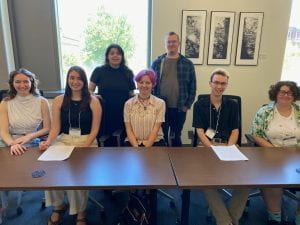

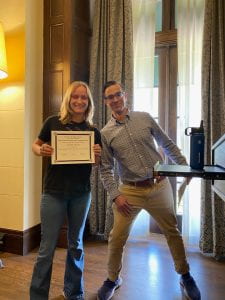
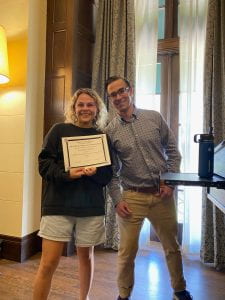
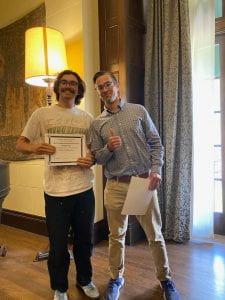
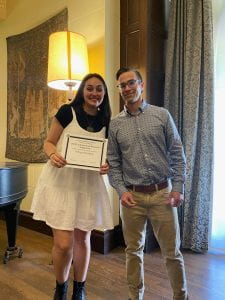
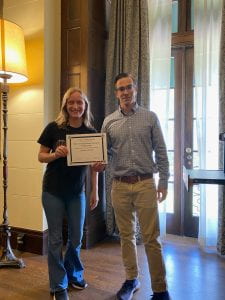
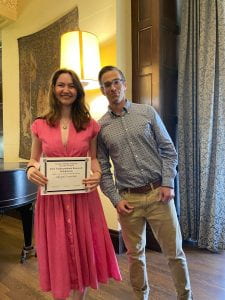
The Sewanee Review Podcast: Garrett Hongo & Eric Smith
“This week on the Sewanee Review Podcast, managing editor and poetry editor Eric Smith catches up with Garrett Hongo, who received the Aiken Taylor Award in Modern American Poetry in 2022. In this episode, Hongo breathes further life into a handful of his poems: ‘A Garland of Light’ details his relationship with Robert Hayden, and ‘Bugle Boys’ reckons with the terrible loss of his father’s hearing and the bittersweet memory of the two men assembling a radio for the last time. History has a habit of swallowing itself up, yet Hongo proves the power of a life’s story told in verse—the possibility of reconjuring the stories that once seemed lost to time. ‘Poetry is human culture,’ Hongo asserts, as both a plea and a prayer.”
Listen to the full podcast here:
Ralph Salisbury
Obituary
Ralph Salisbury
January 24, 1926 – October 9, 2017
Ralph James Salisbury, poet, writer, editor, and professor emeritus at the University of Oregon, died peacefully on October 9, 2017. He was 91.
He was born January 24, 1926, in Fayette County, Iowa, where he grew up hunting and trapping for meat and pelts, and working on his family’s farm, which had no electricity or running water. After surviving a lightning strike at age 15, he was left with “a sense of awe and an intense love of life.”
Ralph graduated from Aurora (Iowa) High School at age 16, and the following year, enlisted in the Air Force, with dreams of rescuing his older brother, who had been captured by Germans in North Africa and was being held as a POW in Italy. He never engaged in active duty, for which he was grateful; he said that the only killing he did during his military service, was the rabid skunk he shot, while on guard duty one night, at an airbase near McCook, Nebraska.
Through World War II Air Force service, Ralph earned six years of university education, including an MFA from the University of Iowa Writer’s Workshop, where he studied under the poet Robert Lowell. During the Korean War, he became a conscientious objector, pacifist, and activist in the early civil rights movement.
Ralph published 11 collections of poetry, including Rainbows of Stone (2000) and Like the Sun in Storm (2012), both finalists for the Oregon Book Award, and Light from a Bullet Hole (2009), nominated for the Pulitzer Prize. He also published three short-story collections and a memoir, So Far, So Good (2013), which received the RiverTeeth Book Award for Literary Nonfiction.
His work reflects his Native American (Cherokee, Shawnee) heritage and family history, his pacifism, and what he described as a “devotion to harmony with nature.” His poem “In the Children’s Museum in Nashville” was published in the New Yorker in 1960, and has attracted attention as a precursor to the contemporary Native American literary movement.
Dedicated, as he said, to the Tribe of the World, Ralph wrote: “Though I have lived and worked among the intelligentsia of many nations, my writing comes from being a questing, mixed-race, working-class individual in a violent world. My work is offered to the spirit of human goodness, which unites all people in the eternal struggle against evil, a struggle to prevail against global extinction.”
For six years the editor-in-chief of Northwest Review, he also edited A Nation Within, an anthology of contemporary Native American writing, and co-translated two books by Sámi (Lapp) poet Nils-Aslak Valkeappää: Trekways of the Wind and The Sun, My Father.
He was Professor Emeritus of Creative Writing and Literature at the University of Oregon, where he began teaching in 1960, and directed the MFA in Creative Writing program, which he helped to develop. Besides the University of Oregon, Ralph also taught at Drake University, Texas A & M University, the University of Frankfurt, and the University of Freiburg (Germany).
A disciplined and prolific writer, Ralph’s literary legacy, passion for justice, truth and beauty, and his far-reaching influence as beloved teacher and friend, is carried on in the lives of his students, many of whom have, in turn, gone on to distinguished literary careers.
A winner of the Northwest Poetry Award, he was also a Rockefeller Foundation Resident at the Villa Serbelloni in Bellagio, Italy. A three-time Fulbright Professor in Germany and a Fulbright translation grant recipient in Norway, he also received an AMPARTS lectureship in India. In 2015, he was honored with the C.E.S Wood Retrospective Award, one of the Oregon Book Awards, celebrating a distinguished career in Oregon Letters.
Over the years, he presented his work in hundreds of poetry readings, on stage, on the radio, and on TV, throughout North America, Europe, the former Soviet Union, and India.
Ralph married Joyce Hulbert in 1948, and they had two sons, Jeffrey and Brian. He and Joyce later divorced. In the spring of 1969, he married poet and writer Ingrid Wendt at Sahalie Falls, along the McKenzie River in the Cascade Mountains of Oregon. They had one daughter, Martina. Ralph and Ingrid recently celebrated 48 years of shared artistic careers, visions, dreams, and adventures.
He is survived by his wife Ingrid of Eugene; sons Jeff and Brian of Eugene; daughter Martina and son-in-law Franco of Brooklyn, NY; four grandchildren: Connor, Travis, Gemma and Gavino; and several generations of nieces and nephews. He was preceded in death by his parents, Olive McAllister and Charles Salisbury, his beloved Aunt Jennie, and five siblings, Robert, Ray, Ruth, Rex, and Leland.
Private burial services will be held at the Eugene Masonic Cemetery. A memorial celebration will be held at 3 p.m. Sunday, January 14, 2018, at Gerlinger Alumni Lounge on the University of Oregon Campus.
In lieu of flowers, the family requests that gifts in memory of Ralph’s lifelong devotion to peace and justice, to human rights, and to furthering public awareness of Native American literature, may be sent to Returning the Gift: A Native and Indigenous Literary Festival (https://rtglitfest.org), the American Civil Liberties Union (https://action.aclu.org/donate), or Mercy Corps (https://www.mercycorps.org/donate).
Published in Eugene Register-Guard on Oct. 29, 2017